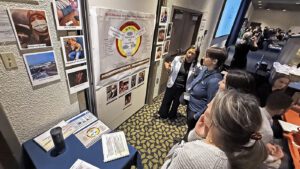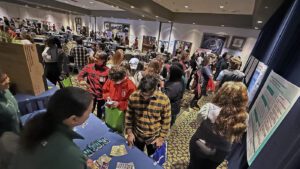Holly Hodder recalls while growing up, hearing stories about the mistrust Elders had towards the European settler class’s health-care system.
Stereotyping, indifference and systemic racism have for decades been reported by Indigenous people as they access publicly funded health-care across Canada and the NWT.
This as Indigenous patients have described more positive healthcare experiences where regionally appropriate traditional healing methods were offered in concert with non-Indigenous medications, surgeries and therapies.
So, the fourth-year Aurora College nursing student decided to use a research project assignment to explore incorporating traditional Indigenous methods in the hospital settings.

Aurora College staff conducted a research project on Birth Journeys Away From Home, which was displayed Wednesday at the Explorer Hotel during Northern Health Research Day. (James O’Connor/CKLB)
“We know that incorporating this into hospital settings can increase the satisfaction of Indigenous clients in patient care, and it’s actually a Truth and Reconciliation Call to Action to implement Indigenous healing practices into care,” she said Wednesday at the college’s Northern Health Research Day at the Explorer Hotel.
“My research question is, in hospital settings, what strategies can contribute to successfully integrating Indigenous healing practices?”
Collaborating with Indigenous communities — specifically Elders, and strong leaders — and listening to Indigenous clients’ needs were some of the strategies here research discovered.
One framework for blended biomedical and Indigenous approaches is called Two-Eyed Seeing, a Mi’kmaw guiding principle that emphasizes the importance of bringing together the strengths of Indigenous and Western knowledge to improve the world for future.
Other projects from the total of 24 students included: Vitamin D supplementation to reduce tuberculosis; AI models for critical care; and financial incentives for northern nursing graduate retention.

Health agencies joined fourth-year Aurora College nursing students Wednesday at the Explorer Hotel during Northern Health Research Day. (James O’Connor/CKLB)
Andreanne Robitaille, manager of Health Research Programs at Aurora Research Institute, said the 24 Bachelor of Nursing students were given directions for the process, but they picked their own topic based on their curiosity, maybe a lived experience.
“They are fourth-year nursing students who led their own research project from September to December to apply the research process and the evidence informed nursing practice,” she said.
“They started with an idea, and then they looked at the literature, they met with people, and then they presented today in a poster.
“And then we have health research organization here with booths: The Institute of Circumpolar Health Research; Hotıì ts’eeda; and we also have the health authorities here, so the students could go and meet with the health authorities for possible jobs.”
Hodder is Chipewyan from Smith’s Landing, raised in Yellowknife, and says she is “definitely, definitely” going to work in the territory, hopefully at Stanton Territorial Hospital.
“I think that there’s definitely a few of us within our class who are from northern communities that plan to give back to their communities … just simply to give back to the community that you were raised in,” she said.





